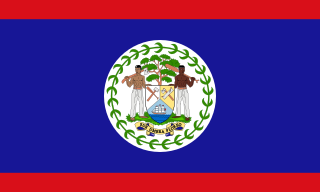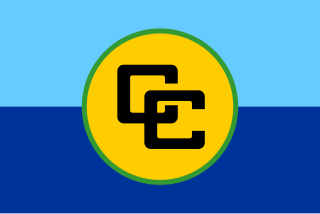
The politics of Antigua and Barbuda takes place in a framework of a unitary parliamentary representative democratic monarchy, wherein the sovereign of Antigua and Barbuda is the head of state, appointing a governor-general to act as vice-regal representative in the nation. A prime minister is appointed by the governor-general as the head of government, and of a multi-party system; the prime minister advises the governor-general on the appointment of a Council of Ministers. Executive power is exercised by the government. Legislative power is vested in both the government and the two chambers of the Parliament. The bicameral Parliament consists of the Senate and the House of Representatives.

Belize is a country on the north-eastern coast of Central America. It is bordered by Mexico to the north, the Caribbean Sea to the east, and Guatemala to the west and south. It also shares a water boundary with Honduras to the southeast.

The World Federation of Trade Unions (WFTU) is an international federation of trade unions established in 1945. Founded in the immediate aftermath of World War Two, the organization built on the pre-war legacy of the International Federation of Trade Unions as a single structure for trade unions world-wide, following the World Trade Union Conference in London, United Kingdom.

The Caribbean Community is an intergovernmental organisation that is a political and economic union of 15 member states throughout the Americas and Atlantic Ocean. They have primary objectives to promote economic integration and cooperation among its members, ensure that the benefits of integration are equitably shared, and coordinate foreign policy. The organisation was established in 1973, with its four founding members signing the Treaty of Chaguaramas. Its primary activities involve:

Belize is a parliamentary representative democratic monarchy, whereby the king of Belize serves as head of state and the prime minister is the head of government, and of a multi-party system. Executive power is exercised by the government. Legislative power is vested in both the government and the Parliament of Belize.
Telecommunications in Belize include radio, television, fixed and mobile telephones, and the Internet.

Belize maintains 14 embassies to foreign countries, one consulate, and three missions to international organizations. In 1990, Belize became a member of the Organization of American States, and the Commonwealth of Nations in 1981.

The British West Indies (BWI) were colonised British territories in the West Indies: Anguilla, the Cayman Islands, Turks and Caicos Islands, Montserrat, the British Virgin Islands, Antigua and Barbuda, The Bahamas, Barbados, Dominica, Grenada, Jamaica, Saint Kitts and Nevis, Saint Lucia, Saint Vincent and the Grenadines, British Guiana and Trinidad and Tobago. Other territories included Bermuda, and the former British Honduras.
Education International (EI) is a global union federation (GUF) of teachers' trade unions consisting of 383 member organizations in 178 countries and territories that represents over 32 million education teachers and education support personnel from pre-school through university. It is one of the world's largest sectoral global union federations.

The Caribbean Court of Justice is the judicial institution of the Caribbean Community (CARICOM). Established in 2005, it is based in Port of Spain, Trinidad and Tobago.
The National Trade Union Congress of Belize is a central trade union representing workers in Belize. The NTUCB is affiliated to the International Trade Union Confederation and the Caribbean Congress of Labor. The NTUCB is an umbrella organization for twelve unions in Belize. These include:

The CARICOM Single Market and Economy, also known as the Caribbean Single Market and Economy (CSME), is an integrated development strategy envisioned at the 10th Meeting of the Conference of Heads of Government of the Caribbean Community (CARICOM) which took place in July 1989 in Grand Anse, Grenada. The Grand Anse Declaration had three key Features:
- Deepening economic integration by advancing beyond a common market towards a Single Market and Economy.
- Widening the membership and thereby expanding the economic mass of the Caribbean Community.
- Progressive insertion of the region into the global trading and economic system by strengthening trading links with non-traditional partners.

Canada–Caribbean relations are the long established relationships between Canada and the many states of the Caribbean or West Indies. These ties have been on-going throughout the history of both regions. Initially these relations were based on the policies of European colonial powers in the Americas. More recently, both Canada and most of the Caribbean islands have achieved self-government, putting their relations into a different phase. CARICOM diplomats have referred to Canada as a '"special friend" of the Caribbean at the regional and bilateral levels.' Ties exist in such plurality of organs such as: the Commonwealth of Nations, the Organisation internationale de la Francophonie, Organization of American States, ParlAmericas, the United Nations, and the World Trade Organization.

The Secretary General of the Caribbean Community is the Chief Executive Officer of the Community and the head of its principal administrative organ, the CARICOM Secretariat.

The Caribbean Free Trade Association (CARIFTA) was an english speaking economic trade organization. It organised on 1 May 1968, to provide a continued economic linkage between the English-speaking countries of the Caribbean. The agreements establishing it came following the dissolution of the West Indies Federation which lasted from 1958 to 1962.

The economy of Belize is a small, essentially private enterprise economy that is based primarily on agriculture, tourism, and services. The cultivation of newly discovered oil in the town of Spanish Lookout has presented new prospects and problems for this developing nation. Belize's primary exports are citrus, sugar, and bananas. Belize's trade deficit has been growing, mostly as a result of low export prices for sugar and bananas.

Relations between Belize and the United States have traditionally been close and cordial. The United States is Belize's principal trading partner and major source of investment funds. It is also home to the largest Belizean community outside Belize, estimated to be 70,000 strong. Because Belize's economic growth and accompanying democratic political stability are important U.S. objectives, Belize benefits from the U.S. Caribbean Basin Initiative. Belize is the only country in Central America that has never received a visit from an American president.

The Trade Union International Public Service and Allied is a section of the World Federation of Trade Unions representing public sector workers.
The Caribbean Postal Union (CPU) is an association established by treaty of the postal authorities of the following member countries: The bloc was established with the assistance of the European Union for member-states of CARIFORUM as part of the bloc of the African, Caribbean, and Pacific Group of States.












